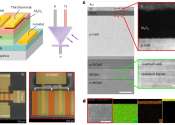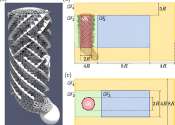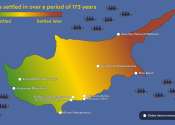Engineering
Floating photovoltaics could limit Africa's future reliance on hydro-generated energy
Floating photovoltaics (FPV), also known as floating solar farms, are photovoltaic systems that can be deployed on the sea's surface or on other bodies of water. While their environmental impact is still the topic of debate ...
42 minutes ago
0
2
Plants & Animals
Furry thieves are running loose in a Maine forest, research shows
Scattered across the Penobscot Experimental Forest are veritable treasure troves for its denizens, each containing riches beyond comprehension. These caches do not contain gold or jewels—they're filled with eastern white ...
22 minutes ago
0
0

Ion irradiation offers promise for 2D material probing
Two-dimensional materials such as graphene promise to form the basis of incredibly small and fast technologies, but this requires a detailed understanding of their electronic properties. ...
Two-dimensional materials such as graphene promise to form the basis of incredibly small and fast technologies, but this requires a detailed understanding ...
Nanomaterials
22 minutes ago
0
0

Study indicates Earth's earliest sea creatures drove evolution by stirring the water
A study involving the University of Cambridge has used virtual recreations of the earliest animal ecosystems, known as marine animal forests, to demonstrate the part they played in ...
A study involving the University of Cambridge has used virtual recreations of the earliest animal ecosystems, known as marine animal forests, to demonstrate ...
Evolution
1 hour ago
0
0

Chemists develop new method for introducing fluorinated components into molecules
A team of chemists at the University of Münster has developed a synthesis method for the site-selective integration of the biologically relevant difluoromethyl group into pyridines.
A team of chemists at the University of Münster has developed a synthesis method for the site-selective integration of the biologically relevant difluoromethyl ...
Analytical Chemistry
1 hour ago
0
0

From fungi to fashion: Mushroom eco-leather is moving towards the mainstream
As fashion designers look for alternatives to leather, growing mycelium—or fungi-based—'leather' substitutes using a new paste media has opened up the possibility of growing this bio-fabricated material faster, and of ...
Biotechnology
1 hour ago
0
0

The neural signature of subjective disgust could apply to both sensory and socio-moral experiences
Disgust is one of the six basic human emotions, along with happiness, sadness, fear, anger, and surprise. Disgust typically arises when a person perceives a sensory stimulus or situation as revolting, off-putting, or unpleasant ...

A promising three-terminal diode for wireless communication and optically driven computing
Two-terminal devices are electronic components connected to electrical circuits via two electrical terminals. Although these components are the key building blocks of most existing devices, they can limit a system's performance ...

Orphan articles: The 'dark matter' of Wikipedia
Wikipedia is the largest platform for open and freely accessible knowledge online yet, in a new study, EPFL researchers have found that around 15% of the content is effectively invisible to readers browsing within Wikipedia. ...
Internet
1 hour ago
0
0

The tentacles of retracted science reach deep into social media: A simple button could change that
In 1998, a paper linking childhood vaccines with autism was published in the journal, The Lancet, only to be retracted in 2010 when the science was debunked.
Internet
1 hour ago
0
0

Study opens the door to designing therapies to improve lung development in growth-restricted fetuses
If during a pregnancy a fetus grows below normal thresholds, at each week of gestation there is an increased risk that some of its organs may not develop properly, which can adversely affect the baby's health after birth. ...
Obstetrics & gynaecology
1 hour ago
0
0

Researchers make strides in microbiome-based cancer therapies via iron deprivation in the tumor microenvironment
A team from POSTECH and ImmunoBiome has made a potential breakthrough in the fight against cancer. Their research, published in the May issue of Nature Immunology, explores a dietary-derived bacterial strain, IMB001. This ...
Oncology & Cancer
1 hour ago
0
0

Study reveals that the brain modulates visual signals according to internal states
What we see is not simply just a neural representation of the pattern of light in the eye, but an interpretation of this image, to which our needs and expectations contribute. These factors are shaped by earlier experiences ...
Neuroscience
1 hour ago
0
0

The Future is Interdisciplinary
Find out how ACS can accelerate your research to keep up with the discoveries that are pushing us into science’s next frontier
 Medical Xpress
Medical Xpress

More leptospirosis cases occur after floods, study shows

Q&A: When depression meds don't work, this may help you turn the corner

New data outline positive effects of endurance exercise training

Study opens the door to designing therapies to improve lung development in growth-restricted fetuses

Research team develops new AI tool to help classify brain tumors

Link between e-cigarette use and early age of asthma onset in US adults discovered

Novel genetic mechanisms may serve as therapeutic target against glioma

Study uncovers key factors for resilience after trauma

New technique to freeze brain tissue without harm

Tick season has arrived. Protect yourself with these tips
 Tech Xplore
Tech Xplore

A new lease on life for old laptops

Parents underestimate the privacy risks kids face in virtual reality

Safer and stronger: Non-flammable electrolyte extends battery life

Energy transition risks critical mineral shortage: IEA

US reaches a new clean energy milestone, with 5 million solar projects installed

Germany turns to coal power to keep the lights on

Mastering fundamentals: First step for promising new sustainable vehicle fuels

Deep-sea sponge's 'zero-energy' flow control could inspire new energy efficient designs
The Venus flower basket sponge, with its delicate glass-like lattice outer skeleton, has long intrigued researchers seeking to explain how this fragile-seeming creature's body can withstand the harsh conditions of the deep ...
General Physics
1 hour ago
0
0

Microplastics may slow the rate at which carbon is pulled from the sea surface to the depths
It turns out plastics in the ocean do more than suffocate turtles, fish and other marine life.
Earth Sciences
1 hour ago
0
0

Study shows plants restrict use of corrective 'Tipp-Ex proteins'
Plants have special corrective molecules at their disposal that can make retrospective modifications to copies of genes. However, it would appear that these "Tipp-Ex proteins" do not have permission to work in all areas of ...
Plants & Animals
1 hour ago
0
11

Researchers in Portugal develop an image analysis AI platform to boost worldwide research
A team of researchers from the Instituto Gulbenkian de Ciência (IGC) in Portugal, together with Åbo Akademi University in Finland, the AI4Life consortium, and other collaborators, have developed an innovative open-source ...
Biotechnology
2 hours ago
0
1

Cell types and molecules usually associated with autoimmune diseases found to be normal components of gut immunity
Researchers in the Peter Gorer Department of Immunobiology have identified that features of the immune system that were previously considered to be characteristics of autoimmune diseases are normal components of the immune ...
Immunology
2 hours ago
0
16

Key protein behind brain asymmetry uncovered by scientists
Genetic mechanisms behind the brain's unique left–right differences are now better understood with new research, paving the way for better understanding of human disorders where brain asymmetry is disrupted.
Genetics
2 hours ago
0
14

Artificial intelligence and the future of surgery
You may not think artificial intelligence could have a role in surgery, but new research shows AI can help solve problems for patients, doctors and the health system. A group of researchers led by surgery researcher Dr. Chris ...
Surgery
2 hours ago
0
5

Researcher discovers drug that may delay onset of Alzheimer's, Parkinson's disease and treat hydrocephalus
A researcher in the Keck School of Medicine of USC's department of surgery has discovered a potential breakthrough in delaying the onset of Alzheimer's and Parkinson's disease and treating hydrocephalus. Young-Kwon Hong, ...
Medications
2 hours ago
0
1

Using DNA origami, researchers create diamond lattice for future semiconductors of visible light
The shimmering of butterfly wings in bright colors does not emerge from pigments. Rather, photonic crystals are responsible for the play of colors. Their periodic nanostructure allows light at certain wavelengths to pass ...
Nanophysics
2 hours ago
0
8

Study finds paleolithic people settled in Cyprus thousands of years earlier than previously thought
The patterns of dispersal of early humans across continents and islands are hotly debated, but according to a new study in Proceedings of the National Academy of Sciences, Pleistocene hunter-gatherers settled in Cyprus thousands ...
Archaeology
2 hours ago
0
1

Ariane 6 launches Replicator for 3D printing in open space
Europe's newest rocket soon launches, taking with it many space missions each with a unique objective, destination and team at home, cheering them on. Whether into Earth orbit to look back and study Earth, peer out to deep ...

Researchers unlock water-saving potential of wheat with TabHLH27 balancing stress and growth
Wheat plays a critical role in global food security, but water scarcity in arid and semi-arid regions hinders its efficient production, suggesting significant opportunities for water saving. Therefore, understanding the genes ...

Researchers confirm scale matters in determining vulnerability of freshwater fish to climate changes
The silver chub isn't considered sensitive to climate change on a national scale, but context matters. For example, if climate change sensitivity is evaluated in only one region of the United States, the freshwater fish appears ...

Victim-survivors of rape and sexual assault feel perpetrators' rights supersede their own at sentencing: Report
Victim-survivors of rape and sexual assault feel perpetrators' rights and interests supersede their own at sentencing, according to new research led by the Scottish Center for Crime and Justice Research (SCCJR).

Researchers discuss current state of homophobia, transphobia and biphobia
Gender-neutral bathrooms, conversion therapy and Quebec's advisory committee on gender identity have been in the news lately. These are polarizing, hot-button issues.

Linking leaf elemental traits to biomass across forest biomes in the Himalayas
The growth, development, and functioning of plants in various environments depend on multiple elements. However, our understanding of how the element concentrations in leaves that are associated with plant functioning and ...

Research finds human activity over natural inputs determines the bacterial community in an ice core
The Tibetan Plateau (TP) has the third-largest number of glaciers after the Antarctic and Greenland. Bacteria, deposited on glacier surfaces through dry and wet deposition, undergo in-situ growth and are subsequently preserved ...

Study shows optical excitation of hot carriers enables ultrafast dynamic control of nanoscale plasmons
Photonic computing, storage, and communication are the foundation for future photonic chips and all-optical neural networks. Nanoscale plasmons, with their ultrafast response speed and ultrasmall mode volume, play an important ...

Researchers suppress non-Hermitian effects via 'fake' magnetic fields
Due to the presence of non-Hermitian components, wave intensities tend to localize at the system boundary, namely the non-Hermitian skin effect. The skin behavior is protected by topology, making it insensitive to minor changes. ...

Report: 'Urgent' change needed to tackle bullying in astronomy and geophysics
"Urgent" action is needed to address an "insidious" and systemic bullying problem within the world of astronomy and geophysics, a report warns.

To save their soil, Kansas tribe shifts to regenerative agriculture—and transforms their farms
When one of the elders in the Iowa Tribe of Kansas and Nebraska asked if he could keep bees on the reservation, Tim Rhodd's answer was straightforward: "Absolutely."

Bolstering environmental data science with equity-centered approaches
Environmental data science and machine learning (ML) are increasingly vital for addressing ecological challenges. However, these technologies can inadvertently perpetuate biases present in their training data, leading to ...

How China's massive water transfer shapes drinking water quality
Dissolved organic matter (DOM), originating from both natural and human activities, is a complex mixture of organic substances that can vary by season, location, and environmental conditions. DOM impacts the coagulation process, ...

Pickleball courts in a legal pickle over the associated noise
Pickleball Legal Consultant is a job title that likely did not exist a decade ago, but as pickleball courts infiltrate neighborhoods to satiate an appetite for a sport whose namesake is a snack, communities take issue with ...

Researchers believe the raptor caracara deserves a public relations makeover
Caracaras are an inquisitive, gregarious, highly intelligent group of predatory birds in the falcon family, whose quirks go largely unnoticed by the public. Caracara researchers, however, say it's time for that to change.

Exploration of polymer cononsolvency mechanism through soft X-ray absorption spectroscopy
A study, published in Physical Chemistry Chemical Physics, investigated the cononsolvency mechanism of poly(N-isopropylacrylamide) (PNIPAM), which is soluble in pure methanol (MeOH) and water but insoluble in aqueous MeOH ...

Study identifies new topogenesis pathway for folding and assembly of multi-spanning membrane proteins
Researchers led by Prof. Zhang Zairong from the Shanghai Institute of Organic Chemistry of the Chinese Academy of Sciences have identified a post-translational topogenesis pathway for the folding and assembly of multi-spanning ...

Hubble views cosmic dust lanes
Featured in this new image from the NASA/ESA Hubble Space Telescope is a nearly edge-on view of the lenticular galaxy NGC 4753. Lenticular galaxies have an elliptical shape and ill-defined spiral arms.

At Thailand dive expo, fears for coral's future
Jakkapat Yodnil calls out to visitors at a diving expo in Bangkok, eager to share details of his shop's expeditions to the azure waters around the Thai island of Koh Tao.

Controversial floating beach unveiled off French Riviera
A controversial private floating beach anchored off the French Riviera has entered service despite opposition from local politicians and environmental groups, its backers said on Friday.










































